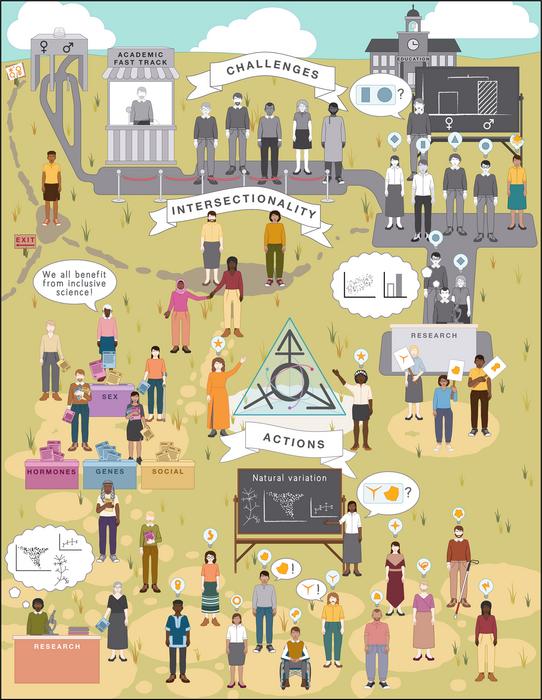A group of 24 transgender (and/or family members of transgender) scientists describe what it’s like to be a transgender person in STEMM. In a commentary publishing on March 14 in the journal Cell, they discuss the historical origins of trans marginalization, explain how this affects trans people’s careers in science and medicine, and lay out actions that cisgender individuals and institutions can take to support trans people in STEMM.

Credit: Cell/Aghi et al.
A group of 24 transgender (and/or family members of transgender) scientists describe what it’s like to be a transgender person in STEMM. In a commentary publishing on March 14 in the journal Cell, they discuss the historical origins of trans marginalization, explain how this affects trans people’s careers in science and medicine, and lay out actions that cisgender individuals and institutions can take to support trans people in STEMM.
This first-of-its-kind commentary appears in a sex and gender focus issue of Cell, covering topics such as gender equity, the history of sex and gender research, and how we can improve the quality of research going forward by using more rigorous and precise sex-related variables.
“I hope that trans scientists can see this piece as a beacon of hope,” says neuroscientist and commentary author Dori Grijseels of the Max Planck Institute for Brain Research. “It can be incredibly isolating to be a trans scientist, especially in particularly hostile places, but I hope that this commentary can give a sense of community to those scientists.”
Currently, anti-trans legislation rooted in anti-scientific transphobic arguments enable these hostile and unwelcoming environments. “By standing up against this, scientists not only play an important role in trans liberation, but also scientific integrity and public trust in science,” says Grijseels.
The challenges trans people face inhibit their involvement in science and the advancement of their careers. “Legal and material precarity puts educational attainment and a productive research career, already a challenge for early career researchers, further out of reach for trans people,” write the authors.
Trans people are more likely to face harassment and discrimination in society and the workplace. They face more scrutiny to uphold what is considered “professional” dress and behavior. “Any way a trans person dresses or acts is automatically taken as a statement that is highly scrutinized, in a way that a majoritarian cis male person won’t necessarily have to expect,” says evolutionary biologist and commentary author Jess F. McLaughlin of the University of Massachusetts Amherst. “It forces us to always be hypervigilant about our own presentation of ourselves in public, which is exhausting and very othering to deal with daily.”
“These expectations punish individuals who do not conform to a narrowly defined set of behaviors,” write the authors. “Controlling what is ‘acceptable’ gendered behavior or expression in the workplace marginalizes trans people, as well as cis people with nonconforming gender expression.”
“Appeals to professionalism have greater consequences for people with intersecting marginalized identities, such as for trans women of color, who face additional, uniquely racialized pressures to perform femininity.”
Finally, the authors outline what cis researchers can do to help their trans colleagues. “Individual actions can be distilled into three key components: showing respect to trans colleagues and students without singling them out, educating oneself and others, and utilizing one’s privilege and influence to advocate for institutional and political change,” write the authors.
“While it’s natural to feel hesitant about potentially making mistakes while trying to help, the risk of inaction—fueled by a fear of making mistakes—is far greater than the risk of attempting to make a positive change,” says neuroscientist and commentary author Evyn S. Dickinson of Yale University.
The burden of making these changes cannot fall solely on trans researchers. These changes will benefit the entire scientific community, write the authors. “Without sustained action by cis colleagues, achieving inclusion and equity becomes the de facto responsibility of those who are already burdened and marginalized.”
“When cis and trans people alike challenge sex and gender essentialism, we enshrine bodily autonomy and intellectual freedom. When we build institutions and systems to support all who contribute, we move to rectify scientific inequity and injustice.”
###
Cell, Aghi et al. “Rigorous science demands support of transgender scientists” https://cell.com/cell/fulltext/S0092-8674(24)00187-9
Cell (@CellCellPress), the flagship journal of Cell Press, is a bimonthly journal that publishes findings of unusual significance in any area of experimental biology, including but not limited to cell biology, molecular biology, neuroscience, immunology, virology and microbiology, cancer, human genetics, systems biology, signaling, and disease mechanisms and therapeutics. Visit http://www.cell.com/cell. To receive Cell Press media alerts, contact [email protected].
Journal
Cell
DOI
10.1016/j.cell.2024.02.021
Method of Research
Commentary/editorial
Subject of Research
Not applicable
Article Title
Rigorous Science Demands Support of Transgender Scientists
Article Publication Date
14-Mar-2024




